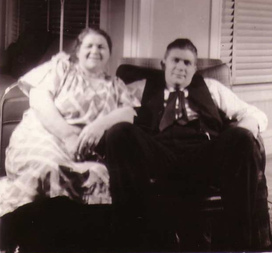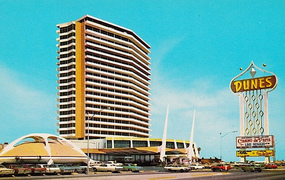






Men of Action: Big Sid Wymanby Bob Pajich | Published: Jul 01, 2013 |
|
|

Sid Wyman had a head like a baked ham and when he laughed “all 260 pounds of him shook. So did the chandeliers, the craps tables and the overhead peep-holes as the Jovian merriment bounced off the walls, shook the desks and rattled around the desert of Las Vegas,” wrote Pulitzer-prize winning sportswriter Jim Murray in 1963.
Wyman had reasons to be so joyful. Cops in Las Vegas don’t storm casinos with axes and split open slot machines like piñatas and they don’t arrest bookmakers or casino managers for simply being themselves. And Wyman could be no one except himself, even if that put him on the wrong side of the law in all but one state for many years.
Wyman, inducted into the Poker Hall of Fame in 1978, was one of the largest bookmakers in St. Louis before moving to Vegas in 1948 and becoming one of the greatest characters the town has ever known.
That included a severe love of fried bananas, big-bet poker games, baccarat and chorus line girls.
Literally being the house didn’t stop him from making plenty of bets as Wyman was known as the casino boss who loved to play the tables so much that the gambling control board made a rule preventing owners to play at their own casinos.
He was a man who navigated the upper management of several casinos during the ’50s and ’60s without ever having someone plant a bomb in any of his cars. And he made it through many days and nights with a lack of sleep that would make Frank Sinatra’s eyes bleed.
As Murray puts it in his succinct column about Big Sid:
“After 13 years, Sid Wyman is still there but still finds it hard to believe the cops won’t shoot the lights out some night. He travels light. No middle name. No wife. No strings. All Sid needs is a deck of cards, a pair of dice and a pad. It’s not even the money he wants, it’s the action.”

Wyman With His Mother
He died in 1978 and was elected to the Poker Hall of Fame by friend Benny Binion a year later as a charter member.
So Long St. Louis
The mob needed Wyman to boost their casinos, and Wyman needed Vegas. The bottom line was that Wyman had two decades of experience running books in St. Louis, and he was well known among the circles of men whose business it is to know these things for his great business sense. And he was free. He had no wife. No kids. Only a sweet tooth and an understanding of what gamblers want by spending many years in St. Louis running illegal gambling joints.
Wyman graduated from Clayton High School just west of St. Louis in 1927. In the next 20 years, Wyman would meet and work with several men in St. Louis who shaped 1950 and ’60s Vegas in drastic ways.
These men, Charlie “Kewpie” Rich, Al Moll and Wyman, would wisely flee the Midwest for the desert after their large interstate gambling operation was raided in 1950, ending a run that brought these gentlemen millions of dollars.
A glimpse inside one of Wyman’s operations – as well as Wyman’s generosity — can be found in Bob Luke’s Dean of Umpires: A Biography of Bill McGowan, 1896-1954. McGowan was a horse-betting addict, and one of his colleagues recalled how he met “all the outstanding bookies in the United States” through McGowan.
“If we had a rained-out game he’d say, ‘Come on Ernie. Let’s go down to the bookie joint.’ Sid Wyman rented a second story of a building just outside of St. Louis. He had ten or fifteen operators hooked up to every track in the United States.”
This was a building open to gamblers, but they also ran an interstate gambling operation that required cooperation from Western Union employees who handled the out-of-state bets and payments. Western Union managers received 25 percent of the winnings after expenses and even gifts like fruit for their help, according to the New York Times.
With so many bets coming in, Wyman and company could afford to throw a few fish back, especially as they happened to be from Major League umpires. From McGowan’s biography:
“(Wyman) let Bill bet every race in the United States and just called it even at the end of the day. I’ve seen Bill lose $2,500 in a day. Sid would say, ‘Why Ernie, I wouldn’t take a nickel from him. He’s got a disease. He’s sick. The man is sick.’”

Morris Shenker
His attorney sitting next to him was none other than Morris Shenker, future Dune’s business partner and representative of the Teamsters’ Jimmy Hoffa and other shady characters. Thanks to his cooperation and his connections, the charges died on the vine and Wyman never even faced a jury.
Sultan of the Dunes
The illicit bookmaking business was worth upwards of $5 million a year for the four partners, and according to Wyman, the operation ran from 1947 to 1950. It was just one of many bookie joints he helped run. Wyman took his money and invested first in the ill-fated Royal Nevada, the Riviera, the Sands and finally the Dunes. He served as gaming operations manager wherever he went.
Big Sid Wyman. Two hundred and sixty pounds of greasy Las Vegas fun. Uncle Big Sid, with his carnation dying of thirst in his lapel, filled the room like few others. His long-time girlfriend, Loretta Powell, was a former Miss USA. He wore out his suit coat’s elbows by rubbing them with countless actors and singers and threw his money at maître d’s and showgirls as if he was the Sultan himself.
Five years from being arrested, and he was a casino boss. Legit and loved.
“Sid Wyman was the big owner of the Dunes, and he was a great man to work for,” wrote Barney vinston in Casino City Times in 2003 about his former employer. “He’d walk through the pit, saying hello to everyone, even greeting us by name. Of course, we were wearing name tags, but it was still a nice gesture. If you were running short, he’d advance you a few bucks till payday, right out of his own kick. Anything you wanted, just ask him for it and you got it. If you crossed him, you were out the door, but that hardly ever happened.”
Wyman stole poker’s “big game” from the Golden Nugget by moving a table to the front of the Dunes in 1969 in order to attract customers. With Wyman’s help, the Dunes became one of the most successful casinos in town, and Wyman was brilliant at attracting the whales of the world. Oftentimes, these big fish ended up sitting between Puggy Pearson and Johnny Moss, staring at a re-raise from Crandell Addington, their hearts beating like Gene Krupa’s drum set.
Wyman loved to gamble and often sat in the game. Tom Wolfe described him in the “big game” this way in his The Kandy-Kolored Tangerine-Flake Streamline Baby, a collection of his early magazine articles:
“Big Sid Wyman, the old Big-Time gambler from St. Louis, is there, with his eyes looking like two poached eggs engraved with a road map of West Virginia after all night at the poker table.”

The Dunes Hotel and Casino
Longtime attorney and friend Morris Shenker, President of Dunes at the time of Sid’s death, halted play on the casino floor on June 28 for two minutes to honor his longtime friend.
According to his nephew Dan, Sid gave generously to Nevada Southern University (currently UNLV), and was listed as a member of the “Rebel Century Club” in a basket program for the 1967-68 season.
At Wyman’s 60th birthday party, someone asked him how old he turned that day. He said he was 240, because one of his years was worth four to an average schmuck. He brought perfume and silk scarfs for all the ladies even though it was his party.
What a guy.
Features
From the Publisher
The Inside Straight
Strategies & Analysis